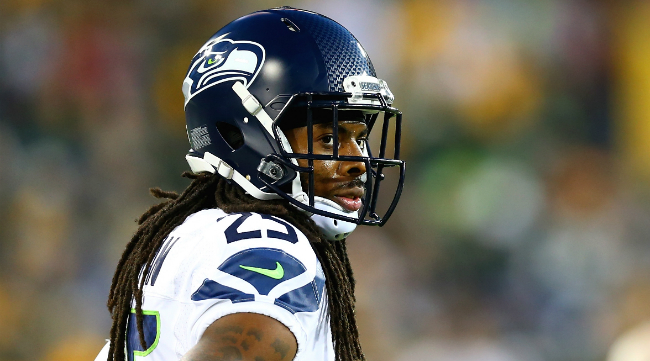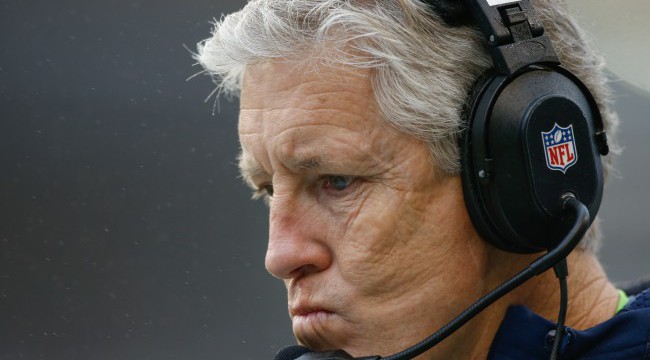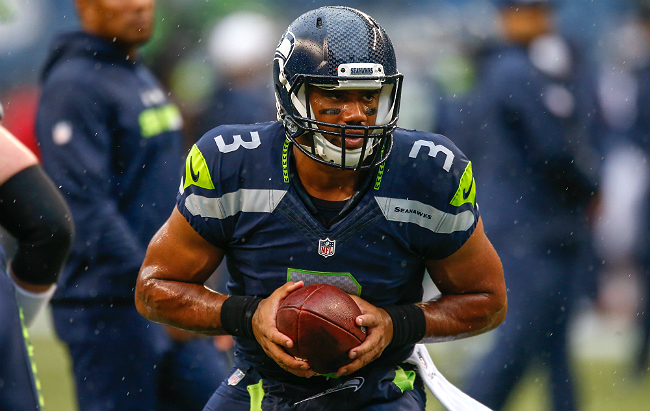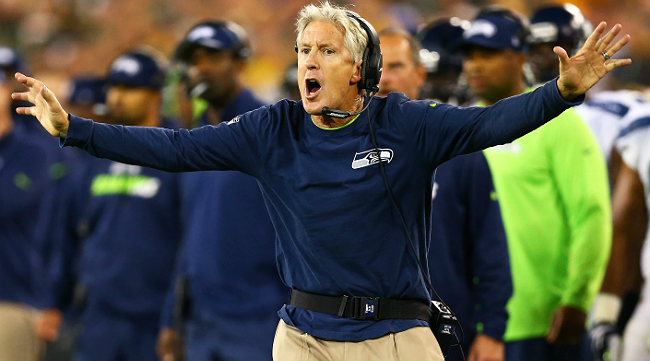
If the Super Bowl Hangover is real, the Seahawks need two ibuprofens and a large bottle of orange Gatorade. Here are past examples of teams that failed to make the playoffs the season after losing in the Super Bowl, a club that Seattle is desperately hoping to avoid joining:
- 1998 Falcons lost to Broncos, then went 5-11 in 1999
- 2000 Giants lost Super Bowl to Ravens, 7-9 the following season
- 2001 Rams lose to Patriots, go 7-9 in 2002
- 2002 Raiders lose to Bucs, go 4-12 in 2003
- 2003 Panthers lose to Patriots, go 7-9 in 2004
- 2004 Eagles lose to Patriots, go 6-10 in 2005
- 2006 Bears lose to Colts, go 7-9 in 2007
- 2007 Patriots lost Super Bowl to Giants, Tom Brady tears ACL and 11-5 team misses playoffs in 2008
It hasn’t happened so much in recent seasons. The 49ers, Steelers, Colts, Patriots, Broncos and Cardinals have all made the playoffs following the Big Game loss. Right now though, it seems like the “curse” may be striking the Seattle Seahawks, who are 2-4 and are facing severe doubts.
Obviously there are a lot of real factors at play that can cause a team to miss the playoffs after a great season. A harder schedule can make wins tougher. Injuries can cripple a team (such as the 2008 Patriots). Free agents leaving, coordinators getting poached, player age, and salary cap trouble can all sink a team. There is a reason many good teams only have so many years to earn that championship and we say their window is closing as the problems pile up.
These are all factors the Seahawks are facing right now. A perfect storm has developed over Seattle, far more powerful than the average raincloud that normally hangs there. The Hawks, one of only two teams since the turn of the century to reach two Super Bowls in back-to-back years, have dug themselves quite the hole already and sit at the bottom of the NFC Wast, tied with the woeful 49ers, who have a far better excuse for their failures. To look at how this has happened, let’s go through each contributing factor.
Schedule

The Seahawks haven’t had the easiest schedule. They had their first two games on the road. One against an improved Rams team that always gives them fits, and one in Green Bay against the Packers, who are early Super Bowl favorites. They then got an easy break at home against the woeful Bears. Then another game at home against a bad team (the Lions) that they very easily could have lost if the back judge had thrown the flag. Then they played two undefeated teams in Cincinnati and Carolina — both managed late game heroics to beat Seattle. Adding in the Lions game, the Hawks could reasonably be 1-5 right now.
Luckily for the Seahawks, the schedule from here gets easier. The only teams left to play that currently have a winning record are the Vikings, Steelers, and Cardinals (twice).
The Offensive Line

The Seahawks O-line is an abomination, at least in pass blocking. Russell Wilson has been sacked more often than any other QB in football (26) and is on pace to set records. The Hawks traded their best lineman (center Max Unger) away to New Orleans and their only other lineman worth a damn (Russell Okung) has been playing poorly (Pro Football Focus has given him four negative grades on the season already, and his only good game was in Week 2). In the Unger deal they received notoriously poor blocking tight end Jimmy Graham. The end result is Russell running for his life seemingly every other pass play and no matter how good Russell is at improvisation, you probably don’t want your offense built around miracle scrambles.
Lack of Weapons on Offense
Jimmy Graham finally had a breakout game against Carolina (eight catches, 140 yards), but the lack of options on offense remains an issue for Seattle. Jermaine Kearse and Doug Baldwin might be the least inspiring WR combo in the league. Marshawn Lynch is still a beast, but he’s banged up and they no longer have an adequate backup. So, Russell is left with few options when he does actually have time to throw.
Darrell Bevell
The offensive coordinator is who most Hawks fans have chosen as the patsy since “the play.” Bevell has not been inspirational as a play caller this season. The Seahawks have been passing the ball more than any team with such a bad offensive line should, especially in the fourth quarter when they should be nursing leads and eating clock (the Seahawks have had a lead in every single fourth quarter this season, yet have only won twice). The Hawks are surprisingly good at rushing, but they instead choose to throw late and fail miserably, giving the opposition extra time. Both the Panthers and Bengals took extreme advantage of this.
The Defense
The famed Seattle defense hasn’t been living up to its high standards. Reason No. 1 is the three reasons already listed: the offense. Seattle is near the bottom of the NFL in time of possession in its last three games, which isn’t necessarily a killer if they’re scoring points, but they aren’t (20 per game in their last three). This leaves the defense on the field longer with less margin for error. Another reason is the loss of defensive coordinator Dan Quinn. After Gus Bradley left for Jacksonville the Seahawks didn’t miss a beat. But the loss of Quinn has hit hard. Seattle’s D is still stout, but it’s not the Legion of Boom we’ve come to know.
The Salary Cap and the Loss of Depth

The Seahawks have discovered one biggest downside of winning the Super Bowl: everyone on the team wants to get paid, and they all have leverage. The Seahawks have done a remarkable job thus far of holding onto their biggest talents (Wilson, Richard Sherman, Kam Chancellor, Earl Thomas, Michael Bennett), but it’s come at the expense of the depth. Lesser players like Malcolm Smith, Robert Turbin, Brandon Browner, Golden Tate, Percy Harvin, Walter Thurmond, and Byron Maxwell have all left, and the Seahawks can’t attract any big replacements due to the now very tight salary cap. Depth is incredibly valuable, and when your team is frequently going deep into January being able to swap out players frequently keeps everyone fresh.
Injuries
This hasn’t hurt Seattle that much, but it has impacted Marshawn Lynch (he missed both the Lions and Bengals games with a hamstring injury). But while big injuries haven’t been an issue yet, fatigue might be. The Seahawks have gone deep into January for three years straight, adding at least several extra games to an already brutal season. It’s the kind of wear that builds up in players, who now have less time to recover and do more damage to their bodies.
So, here they sit at 2-4, with their odds of making the playoffs currently at 30 percent and diminishing rapidly with each loss. The NFC is weak right now and their schedule eases up from here on, but making the playoffs after starting 2-4 is not something many teams have done and they have a difficult uphill climb ahead of them.






